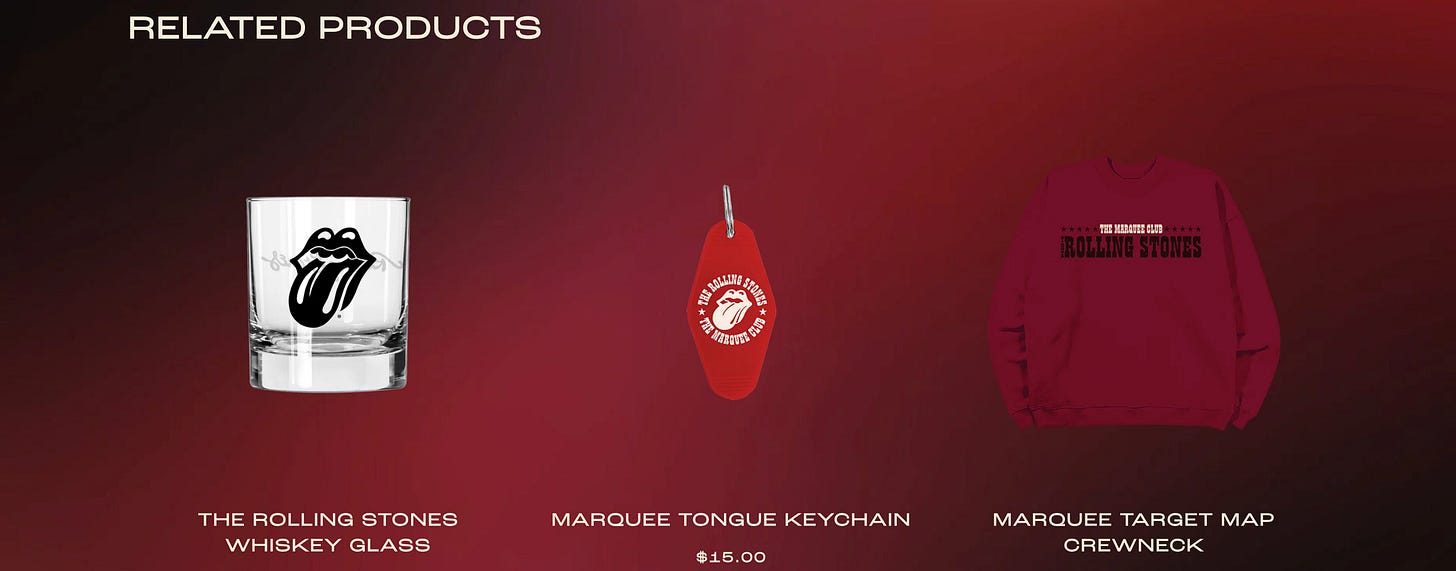The Rolling Stones have now been the world’s greatest rock and roll band for over half a century—60 years, starting with five classic albums released in the 20 months between April 1964 and December 1965. That’s right, five in under two years: The Rolling Stones (U.S. moniker: England’s Newest Hit Makers), 12 X 5, The Rolling Stones, Now!, Out of Our Heads, and December’s Children. Then followed six more before 1970, with only the Sgt. Pepper jape Their Satanic Majesties Request of questionable quality and the superb U.S.‑only odds‑and‑sods collection Flowers surrounded by four albums I’d call indubitably great: Aftermath, Between the Buttons, Beggars Banquet, and Let It Bleed. And soon there were two more classics: Sticky Fingers in 1971 and 1972’s Exile on Main Street double‑LP, which though it took a while to catch on is now generally regarded as their greatest. That’s a hell of a catalogue to surface in under a decade. No wonder they’ve remained more or less the world’s greatest so forth and so on for so long.
Only more or less, however, because the quality of the albums that kept on coming diminished post‑1972: Goats Head Soup, the all too well‑titled It’s Only Rock ‘n’ Roll, arguably even 1976’s Black and Blue. But although nobody continues that argument with 1978’s sui generis fave Some Girls, 1979 is when the quality really begins to tatter, especially for those who don't share my affection for Steve Lillywhite’s booming 1985 Dirty Work. I saw the Stones live quite a few times post‑1970, most memorably at Shea Stadium with Jagger roaming centerfield so irrepressibly Lenny Dykstra himself was impressed. But not even their 1972 Madison Square Garden performance came close to matching the band’s August 26, 2005 show in Hartford, which ended with Jagger sprinting the full 65 yards stage left to stage right and if memory serves back again—a concert I later learned was sponsored by the real estate outfit Ameriquest, which would soon be hurrying along the 2008 banking crisis. True, the anti‑Bush song on the 2005 A Bigger Bang album they were promoting failed to hold off said crisis for an instant. But it was comforting to imagine that their hearts were in the right place. A Bigger Bang proved their best album of new material since Some Girls and arguably Tattoo You a quarter century before or anything since unless you count the 32 r&b‑etc. covers they strung together on the all‑juvenilia 2017 On Air (Deluxe Edition).
That’s because r&b oldies are decisively more fun than any of the 12 new songs on Hackney Diamonds, the Stones’ first album of previously unheard material since, Lordy, A Bigger Bang. By now, of course, there are only two original Stones: the songwriting frontman duo of vocalist Mick Jagger and guitarist Keith Richards. Richards’s opposite number Brian Jones drowned in his swimming pool in 1969 and was replaced first by blues specialist Mick Taylor and then Faces troublemaker Ron Wood. In 1993, bassist Bill Wyman departed to pursue his dreams of sexual perfection while publishing 11 books and was replaced primarily by the more accomplished Darryl Jones. Crucially, deft, solid drummer Charlie Watts, who died at 80 in 2021, has been replaced by the noisier, more muscular virtuoso Steve Jordan. And although the world’s greatest rock and roll band has thus been reduced to Mick and Keith, with nobody claiming Charlie isn’t missed, clearly the new album is the revamped band’s chance to add a classic to its own recorded legacy.
The way I’ve heard it since I obtained a CD two months ago, this strategy failed pretty much utterly. There’s no saucy spritz here, no agility, no esprit. With Watts replaced by Jordan, there’s also no lightness and not much economy to the groove, and while Jagger’s voice definitely ain’t dead yet, his tonsils have been spending too much time in the weight room. Yet nose around and learn that most of the reviews of the new album have been enthusiastic, even grateful, with some would‑be promo man in The Telegraph delivering a rave that rates a full 100 in Metacritic, where 15 of the reviews were calibrated at 80 or above and only the next 10 70 or below. But that doesn’t mean it never got panned. The most notable hatchet job on the album’s “hackneyed duds,” by Grayson Haver Currin in the now disgracefully downsized Pitchfork, compares “petulant ex” Jagger to a “sneering middle‑aged dad”: a “pops who reminds everyone how hard he’s worked, how little thanks he gets,” and how he’s also, somewhat inexplicably, “still taking the pills” and “off to Brazil.” How does Currin characterize the band’s fundamental commercial m.o.? “Eternal avarice.”
Personally, I still think the Stones were the world’s greatest rock and roll band for an impressive spell. For sure I still play their albums, my enduring favorite the first one I ever owned, The Rolling Stones, Now! But Let It Bleed and to a lesser extent Some Girls and Exile are also go‑to’s. In all four of those albums I’d say both groove and tune count for as much as message or vision or even greatness itself. Hackney Diamonds I expect I’ll never play again—certainly not for pleasure. But if Currin should find himself in the mood to check back one more time, there are many other places to start.





